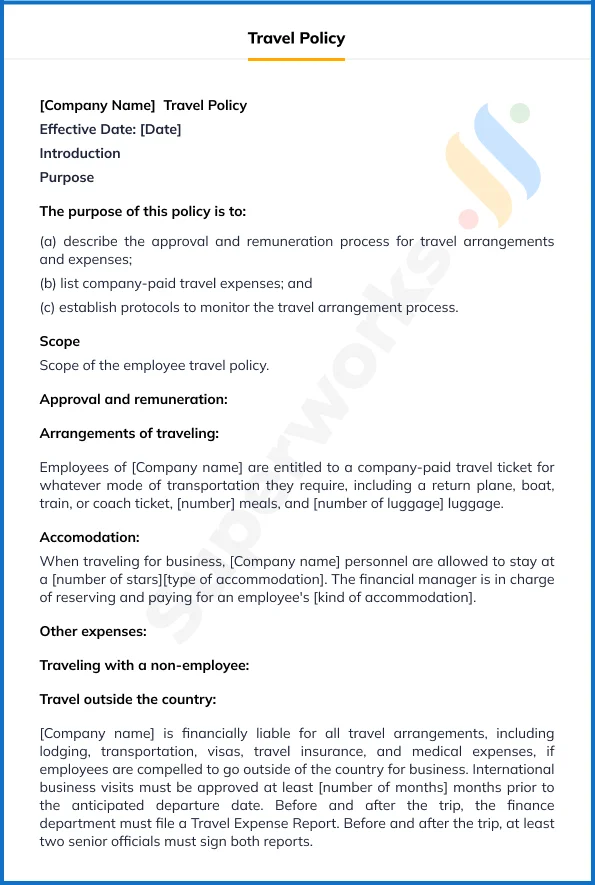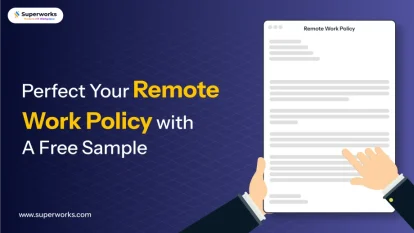Grab a chance to avail 6 Months of Performance Module for FREE
Book a free demo session & learn more about it!
-
Will customized solution for your needs
-
Empowering users with user-friendly features
-
Driving success across diverse industries, everywhere.
Grab a chance to avail 6 Months of Performance Module for FREE
Book a free demo session & learn more about it!
Superworks
Modern HR Workplace
Your Partner in the entire Employee Life Cycle
From recruitment to retirement manage every stage of employee lifecycle with ease.


Seamless onboarding & offboarding
Automated compliance & payroll
Track performance & engagement
Crafting an Effective Travel Policy Template: The Complete Guide
- travel policy template free
- 6 min read
- October 24, 2023

- What Is a Travel Policy For Employees?
- Definition and Purpose
- Objectives of an Employee Travel Policy
- Reason Why Should Organizations Have a Travel Policy?
- Compliance and Cost Control
- Employee Satisfaction and Retention
- Types of Employee Travel Policies
- Challenges in Implementing a Travel Policy in India
- Sample Travel Policy For Employees
- Conclusion
What Is a Travel Policy For Employees?
Travel policies are an integral part of any organization’s HR toolkit, and they play a important role in regulating and facilitating employee travel. But what exactly is a travel policy, and why is it so significant for modern businesses in the HRMS software industry?
A travel policy is a comprehensive set of guidelines, rules, and principles that govern how employees conduct and manage their business-related travel activities. It serves as a guiding framework that outlines the dos and don’ts, expectations, and procedures when employees are on the move for work purposes.
Note: You can download directly from here and edit as per your need.
Definition and Purpose
A travel policy is a set of guidelines and rules governing employee travel and expenses incurred during business trips. Its primary purpose is to ensure that employees adhere to company standards while travelling for work, promoting cost control and compliance.
Objectives of an Employee Travel Policy

A well-structured travel policy aims to achieve several key objectives:
Cost Control: Managing travel expenses efficiently to minimize financial impact.
Compliance: Ensuring that employees adhere to company regulations and industry standards.
Employee Satisfaction: Creating a clear and fair travel framework contributes to employee satisfaction.
Risk Management: Mitigating potential risks associated with travel.
Reason Why Should Organizations Have a Travel Policy?
Company travel policy for employees are essential for organizations in the HRMS software industry, serving many purposes that benefit the company and its employees.
Compliance and Cost Control
Implementing a travel policy ensures compliance with relevant regulations and standards. This is essential, particularly in a field where meticulous record-keeping and compliance are paramount. It also enables effective cost control, which is crucial in managing expense related to employee travel.
A well-structured HR policy, aligned with industry standards, ensures that your organization doesn’t face financial or legal penalties. Additionally, it reduces the risk of fraudulent expense claims, which can substantially impact your budget.
Employee Satisfaction and Retention
Employee satisfaction is directly tied to how well an organization handles its travel policies. A well organized travel policy, which aligns with employee needs and preferences, can significantly boost job satisfaction and ultimately lead to higher employee retention.
Employees are more likely to feel valued and appreciated when they see that their company has policies to support their travel needs. This can enhance their overall job satisfaction and reduce turnover rates.
Moreover, a travel policy clearly defining the reimbursement process and timeframes can contribute to employee satisfaction. Employees want to be assured that their out-of-pocket expenses will be reimbursed promptly and fairly.
Types of Employee Travel Policies
Depending on the nature of an organization and its global footprint, different types of travel policies may be needed.
Domestic Travel Policy

Domestic travel policies are designed for employees who primarily undertake business trips within the country. Travel and expense policy addresses expenses and procedures relevant to domestic travel.
A well-structured domestic travel policy is crucial, especially for all companies with various clients and projects in the country. This policy should provide detailed guidelines on booking accommodations, transportation, and meal expenses for domestic trips.
Moreover, it should outline the approval process, expense reporting requirements, and reimbursement procedures for employees travelling within the country.
International Travel Policy

On the other hand, international travel policies are tailored to employees who travel internationally for work. They encompass broader considerations, including visas, foreign currency expenses, and international regulations.
An international travel policy is important for all IT companies with a global presence. It should cover visa requirements, cultural sensitivity training, travel insurance, and international tax implications. Additionally, the policy should provide guidance on handling emergencies abroad and obtaining consular services.
Furthermore, it should clearly outline the procedures for converting foreign currency, handling international expenses, and seeking reimbursement for expenses incurred during international trips.
Read more : Why Providing Employee Transport Services is Need of the Hour?

Still wasting time on craft Travel Policy? – Make process simple with us
Check Superworks for all 300+ ready-made and 100% customizable HR policy templates, letters, forms, and more.
So, when you are trying to use our HR templates and increase communication skills!
Challenges in Implementing a Travel Policy in India
Implementing a travel policy in India can be particularly challenging due to cultural diversity and regulatory variations across different states. Companies operating in India must address these challenges effectively.
Cultural and Regulatory Diversity
India’s cultural diversity can impact employees’ perception of and follow the travel expense policy. Sensitivity to various cultures and customs is vital in maintaining employee satisfaction and adherence to the policy.
1. Cultural Diversity and Sensitivity
India is a melting pot of cultures, languages, traditions, and beliefs. With many diverse backgrounds and customs, it’s crucial to consider the cultural dimension of travel policy implementation.
2. Cultural Awareness Training:
To navigate the intricate web of cultural nuances, company travel policy must consider providing cultural awareness training to their employees. Understanding and respecting various cultural practices and etiquettes is essential, as it can significantly impact business relationships and overall success. This awareness enhances the travel experience and promotes a positive image of the company that respects and values cultural diversity.
3. Client Engagement:
HRMS software companies often engage with clients from various backgrounds. This makes cultural sensitivity even more vital. Employees should have the knowledge and skills to adapt to cultural expectations during client interactions, ultimately fostering better client relationships.
Regulatory Variations Across States
India’s federal structure gives rise to regulatory variations across different states, complicating travel policy implementation.
1. Regional Compliance:
Companies operating in multiple Indian states need to be well-versed in the intricacies of regional regulations. Each state may have different rules concerning taxation, permits, and other aspects of travel, which should be incorporated into this policy to ensure compliance.
2. Taxation:
Tax laws can vary significantly between states, impacting expenses and reimbursements. A well-crafted business travel policy should address these variations and provide clear guidelines for employees.
3. Legal Implications:
Failure to adhere to regional regulations can lead to legal complications. As such, HRMS software companies should work closely with legal experts to ensure that their policy aligns with the specific requirements of each state they operate in.
Sample Travel Policy For Employees
Conclusion
In conclusion, an effective travel policy is a crucial tool for all organizations, helping them manage employee travel efficiently, maintain compliance, and enhance employee satisfaction. Companies can create policies that meet their specific needs and promote successful business travel by understanding the types of travel policies, addressing unique challenges, and utilizing sample templates.
With Superworks’ free travel policy template, organizations can streamline their operations, reduce costs, and ensure the satisfaction and retention of their valued employees.
Also, See: Data Retention Policy | Employee rewards & recognition







